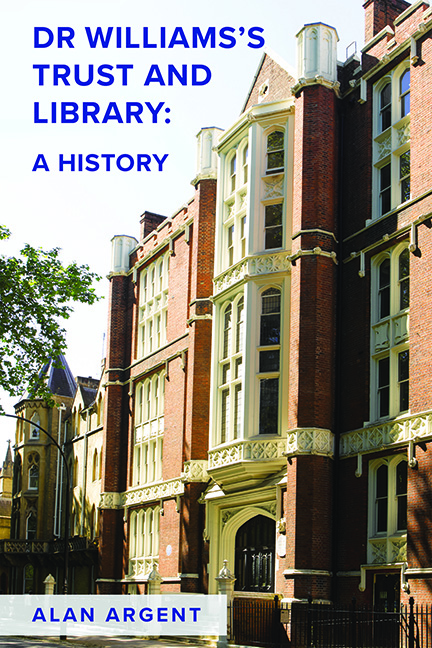Book contents
- Frontmatter
- Dedication
- Contents
- List of Illustrations
- Foreword
- Preface
- Abbreviations
- Notes on Dates, Money, Welsh Place Names and Publications
- Prologue
- 1 Dr Williams and His Will
- 2 Benjamin Sheppard, Receiver 1721–31: Faith, Fitness, and Diligence
- 3 Constructing the Library Building 1725–30: A Proper Plan
- 4 Francis Barkstead, Receiver 1731–47: Piety and Charity
- 5 John Cooper, Receiver 1748–62: Liberty and Liberal Dissent
- 6 Richard Jupp junior, Receiver 1762–95: A Very Respectable Body
- 7 Richard Webb Jupp, Receiver 1795–1850, and David Davison, Receiver 1850–7: Fashionable Sympathies Amid Increasing Light
- 8 Walter D. Jeremy, Receiver 1857–93: The Scrupulous Observer
- 9 Francis H. Jones, Secretary and Librarian 1886–1914: Introducing Order
- 10 Robert Travers Herford, Secretary and Librarian 1914–25: Application and Imagination
- 11 Stephen Kay Jones, Librarian 1925–46, and Joseph Worthington, Secretary 1925–44: A New Age with Old Strains
- 12 Roger Thomas, Secretary 1944–66 and Librarian 1946–66: Trusted Innovator
- 13 Kenneth Twinn, Secretary and Librarian 1966–76: Modest Dependability
- 14 John Creasey, Librarian, and James McClelland, Secretary, 1977–98: Mixed Blessings
- 15 David Wykes, Director 1998–2021: Past, Present, and Future
- 16 Dr Williams’s Trust: An Assessment
- Appendix 1 Trustees in 1723
- Appendix 2 Lists from Short Account (with later additions)
- Bibliography
- Index
16 - Dr Williams’s Trust: An Assessment
Published online by Cambridge University Press: 26 May 2022
- Frontmatter
- Dedication
- Contents
- List of Illustrations
- Foreword
- Preface
- Abbreviations
- Notes on Dates, Money, Welsh Place Names and Publications
- Prologue
- 1 Dr Williams and His Will
- 2 Benjamin Sheppard, Receiver 1721–31: Faith, Fitness, and Diligence
- 3 Constructing the Library Building 1725–30: A Proper Plan
- 4 Francis Barkstead, Receiver 1731–47: Piety and Charity
- 5 John Cooper, Receiver 1748–62: Liberty and Liberal Dissent
- 6 Richard Jupp junior, Receiver 1762–95: A Very Respectable Body
- 7 Richard Webb Jupp, Receiver 1795–1850, and David Davison, Receiver 1850–7: Fashionable Sympathies Amid Increasing Light
- 8 Walter D. Jeremy, Receiver 1857–93: The Scrupulous Observer
- 9 Francis H. Jones, Secretary and Librarian 1886–1914: Introducing Order
- 10 Robert Travers Herford, Secretary and Librarian 1914–25: Application and Imagination
- 11 Stephen Kay Jones, Librarian 1925–46, and Joseph Worthington, Secretary 1925–44: A New Age with Old Strains
- 12 Roger Thomas, Secretary 1944–66 and Librarian 1946–66: Trusted Innovator
- 13 Kenneth Twinn, Secretary and Librarian 1966–76: Modest Dependability
- 14 John Creasey, Librarian, and James McClelland, Secretary, 1977–98: Mixed Blessings
- 15 David Wykes, Director 1998–2021: Past, Present, and Future
- 16 Dr Williams’s Trust: An Assessment
- Appendix 1 Trustees in 1723
- Appendix 2 Lists from Short Account (with later additions)
- Bibliography
- Index
Summary
In his will Daniel Williams proved to be a man of his time. He provided chiefly for causes that other dissenters also favoured, although his desire to convert the Irish to Protestantism, preferably Presbyterianism, and that the SSPCK should undertake missions in New England, betray personal interests. Of his benefactions DWL is the principal survivor. Admittedly the SSPCK and the New England Company still exist, though, like DWT, transformed in identity, and ‘the college in New England’, Harvard University, has prospered. Pleasingly DWT's link with Glasgow University has been revitalised in the twenty-first century, with postgraduate courses in theology, undertaken in either London or Glasgow. Above all, DWL reflects Williams's original vision and most completely that of his first trustees.
Over the years DWL has come to contain approximately 135,000 printed volumes, perhaps half of these published before 1851. They include some incunabula, and approximately twenty thousand of the rare printed titles (half being pamphlets) are in the English Short Title Catalogue. Their subject matter includes not only Christian theology, church history, philosophy, Hebrew traditions, and other religions, but also books on early medicine and science. In addition to the printed collections, DWL has some ninety major manuscript holdings.
Daniel Williams was the most important benefactor of religious dissent, primarily of Presbyterianism. His was a generous approach, supporting Congregationalists and Presbyterians, which was maintained by Unitarian trustees subsequently. The trust and library are singular survivors of private philanthropy and of the voluntary principle in a world of large, often state-funded, monoliths. Credit for this survival must go to trustees who, with few exceptions, have behaved with dedication throughout, giving time, money, manuscripts, books, and portraits. DWL is a primary research facility, replete with unexpected gems, extending well beyond its reputation for antiquated theology. That this ‘leading library of dissenting book and papers’ remains open to the public, as its founder intended, is testimony to the warm-hearted dissent that it represents. With no state funding, the trustees continue to be fully responsible for DWT's finances. Their officers have, with few exceptions, discharged their duties well, some outstandingly.
From the outset DWT established those charities specified in Williams's will. That most of these causes have now ceased does not mean that they failed.
- Type
- Chapter
- Information
- Dr Williams's Trust and Library , pp. 279 - 280Publisher: Boydell & BrewerPrint publication year: 2022

